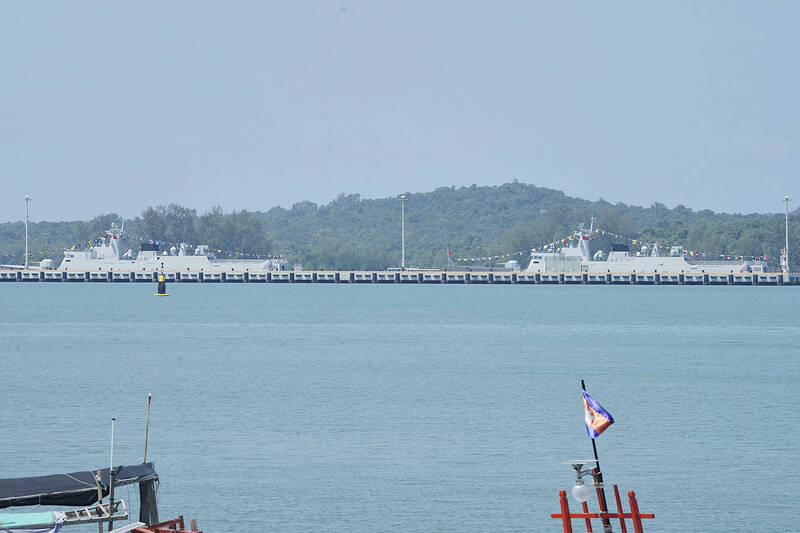Cambodia and China yesterday began their largest-ever joint military exercises, involving advanced Chinese military hardware including artillery, warships and robot battle dogs.
Cambodia has long been an ally of China, receiving billions of dollars in investments, while Washington has voiced concerns that Beijing is using a Cambodian naval base it renovated on the Gulf of Thailand to expand its influence in the region.
Nearly 900 Chinese military personnel and more than 1,300 Cambodian soldiers are taking part in the drills that are to last until May 28, the Royal Cambodian Armed Forces (RCAF) said in a statement.

Photo: AP
The drills would feature advanced Chinese military hardware, including armored vehicles, helicopters, warships, reconnaissance drones and robot battle dogs, the statement said.
The annual exercises were to “develop deeper ties and cooperation” between the two armies, it said.
“The exercises are bigger than last year in terms of both personnel and equipment,” RCAF spokesman Thong Solimo told reporters.
A large Chinese naval vessel, the Changbai Shan, on Monday docked at Cambodia’s Beijing-renovated Ream Naval Base with the military equipment for the drills, he said.
Cambodian political analyst Ou Virak told reporters that “China does want to flex its muscle” and to send a message that “it’s a superpower” through the exercises, dubbed Golden Dragon.
“Definitely China is trying to ... grow its influence within the region,” he said.
“Beyond just flexing the muscle, it needs to build confidence amongst its partners to say to the partners that China is growing, China is expanding, China is also getting stronger, both in size, but also in technological advancement, as well as military might,” Ou Virak added.
Cambodia is also expected to receive two warships from China.
The first Golden Dragon drills were held in 2016, and in early 2017 Cambodia scrapped a similar joint exercise — Angkor Sentinel — which had been held for the preceding seven years with US forces.
The drills follow a two-day visit by Chinese President Xi Jinping (習近平) to Cambodia last month to deepen ties between the two countries.

The Central Election Commission has amended election and recall regulations to require elected office candidates to provide proof that they have no Chinese citizenship, a Cabinet report said. The commission on Oct. 29 last year revised the Measures for the Permission of Family-based Residence, Long-term Residence and Settlement of People from the Mainland Area in the Taiwan Area (大陸地區人民在台灣地區依親居留長期居留或定居許可辦法), the Executive Yuan said in a report it submitted to the legislature for review. The revision requires Chinese citizens applying for permanent residency to submit notarial documents showing that they have lost their Chinese household record and have renounced — or have never

A magnitude 5.6 earthquake struck off the coast of Yilan County at 12:37pm today, with clear shaking felt across much of northern Taiwan. There were no immediate reports of damage. The epicenter of the quake was 16.9km east-southeast of Yilan County Hall offshore at a depth of 66.8km, Central Weather Administration (CWA) data showed. The maximum intensity registered at a 4 in Yilan County’s Nanao Township (南澳) on Taiwan’s seven-tier scale. Other parts of Yilan, as well as certain areas of Hualien County, Taipei, New Taipei City, Taoyuan, Hsinchu County, Taichung and Miaoli County, recorded intensities of 3. Residents of Yilan County and Taipei received

Taiwan has secured another breakthrough in fruit exports, with jujubes, dragon fruit and lychees approved for shipment to the EU, the Ministry of Agriculture said yesterday. The Animal and Plant Health Inspection Agency on Thursday received formal notification of the approval from the EU, the ministry said, adding that the decision was expected to expand Taiwanese fruit producers’ access to high-end European markets. Taiwan exported 126 tonnes of lychees last year, valued at US$1.48 million, with Japan accounting for 102 tonnes. Other export destinations included New Zealand, Hong Kong, the US and Australia, ministry data showed. Jujube exports totaled 103 tonnes, valued at

BIG SPENDERS: Foreign investors bought the most Taiwan equities since 2005, signaling confidence that an AI boom would continue to benefit chipmakers Taiwan Semiconductor Manufacturing Co’s (TSMC, 台積電) market capitalization swelled to US$2 trillion for the first time following a 4.25 percent rally in its American depositary receipts (ADR) overnight, putting the world’s biggest contract chipmaker sixth on the list of the world’s biggest companies by market capitalization, just behind Amazon.com Inc. The site CompaniesMarketcap.com ranked TSMC ahead of Saudi Aramco and Meta Platforms Inc. The Taiwanese company’s ADRs on Tuesday surged to US$385.75 on the New York Stock Exchange, as strong demand for artificial intelligence (AI) applications led to chip supply constraints and boost revenue growth to record-breaking levels. Each TSMC ADR represents